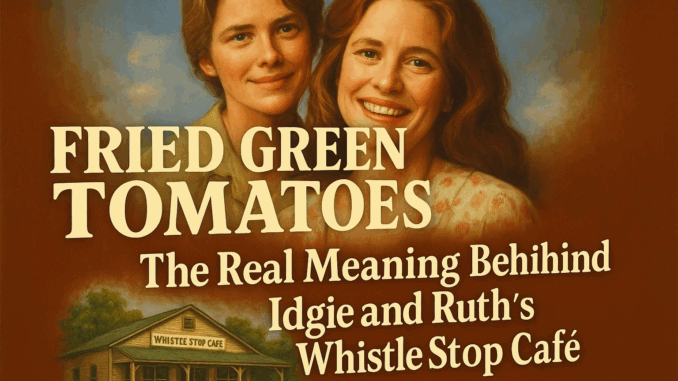
When you hear about the Whistle Stop Café, you probably think of fried green tomatoes, small-town charm, and characters that feel larger than life. At the heart of it all were two women: Idgie Threadgoode and her best friend, Ruth Jamison. Their story isn’t just about running a café it’s about resilience, love, and living unapologetically.
In this article, we’ll dive into the lives of Idgie and Ruth, what made them unforgettable, and why their story still resonates with people today.
Who Were Idgie and Ruth?
Idgie Threadgoode, known for her wild, free-spirited personality, was not your average Southern woman of the early 20th century. She was bold, outspoken, and marched to the beat of her own drum. On the other hand, Ruth Jamison was gentle, kind-hearted, and graceful a balance to Idgie’s fiery energy.
Together, they created a friendship that blossomed into something far deeper, something that fueled the Whistle Stop Café’s soul.
The Birth of the Whistle Stop Café
The Whistle Stop Café wasn’t just a business; it was a symbol. For the people of Whistle Stop, Alabama, it was the center of community life. Idgie and Ruth served hearty meals with warmth, laughter, and a side of rebellion against the norms of their time.
The café became a safe haven where anyone, regardless of background, could find acceptance.
Idgie Was a Character, All Right
If you’ve ever met someone who seemed too unique to be contained by rules, that was Idgie. She wore men’s clothes, cracked jokes, and refused to fit the mold of Southern womanhood. She was mischievous, quick-witted, and had a heart that beat for justice.
Idgie wasn’t afraid to stand up for what she believed in, even if it meant ruffling feathers. That’s exactly why people adored her.
Ruth: The Heart of the Café
While Idgie brought energy and rebellion, Ruth grounded the café with compassion. She made sure every customer felt cared for and every meal carried a touch of love. Her quiet strength balanced Idgie’s chaos, creating a harmony that made their partnership thrive.
Without Ruth, the Whistle Stop Café wouldn’t have been the same.

A Friendship That Defied the Times
Idgie and Ruth’s bond was unusual for the time period. Some saw it as scandalous, while others admired their loyalty. Whatever people thought, the truth is clear: they shared a deep love and respect that transcended societal expectations.
Their relationship stood as a quiet act of defiance against a world that wanted to define them.
The Food That Brought People Together
Fried green tomatoes might be the dish everyone remembers, but the café offered more than just food. Meals were served with stories, jokes, and kindness. The food became a reason to gather, but the real magic was in the community Idgie and Ruth built.
Standing Up for What’s Right
Idgie was no stranger to trouble, especially when it came to protecting people she loved. Whether it was standing up against racism, helping those in need, or shielding Ruth from harm, Idgie proved time and again that courage comes in many forms.
Why Idgie and Ruth’s Story Still Matters
At its core, their story is about authenticity and bravery. Idgie refused to be someone she wasn’t. Ruth chose love over fear. Together, they proved that living true to yourself can inspire others even decades later.
The Whistle Stop Café as a Symbol
The café wasn’t just a restaurant; it was a metaphor for acceptance, resilience, and home. It was where people felt safe, welcomed, and seen. Even today, it remains a cultural icon thanks to Fried Green Tomatoes.
Lessons We Can Learn from Idgie
-
Be unapologetically yourself
-
Stand up for people who can’t stand up for themselves
-
Don’t let society box you in
-
Friendship and love are worth fighting for
Ruth’s Lasting Influence
Though Ruth’s life was cut short, her impact was long-lasting. Her kindness and quiet courage shaped the café’s spirit. Ruth reminded everyone that strength doesn’t always roar—it often whispers through acts of compassion.
Idgie After Ruth
Life without Ruth wasn’t the same for Idgie. Yet, she carried on, keeping Ruth’s memory alive through stories and the café’s spirit. Her resilience became part of her legacy.
The Power of Storytelling
The reason we still talk about Idgie and Ruth today is storytelling. Whether through Fannie Flagg’s novel or the film adaptation Fried Green Tomatoes, their story has touched countless hearts.
It reminds us of the importance of friendship, courage, and community.
Why the Whistle Stop Story Resonates Today
Even in today’s fast-paced, digital world, people crave connection and authenticity. Idgie and Ruth’s story delivers exactly that. Their lives echo the timeless message that love, acceptance, and bravery never go out of style.
Keeping the Legacy Alive
Fans still visit places inspired by the Whistle Stop Café. Recipes are shared, quotes are repeated, and Idgie’s name continues to symbolize living boldly. It’s proof that stories, when told with heart, never fade.
Conclusion
Idgie and Ruth weren’t just characters in a story they were symbols of courage, love, and community. Running the Whistle Stop Café wasn’t about food; it was about creating a space where everyone felt they belonged.
Idgie was a character, all right but she was also a force of nature who, alongside Ruth, built a legacy that continues to inspire.
FAQs
1. Was the Whistle Stop Café a real place?
Yes, it was inspired by a real café in Alabama, though the story adds fictional elements.
2. Were Idgie and Ruth based on real people?
Fannie Flagg, the author, has said the characters were inspired by people she knew, though they’re not exact replicas.
3. What made Idgie such a memorable character?
Her fearless personality, wit, and refusal to conform made her unforgettable.
4. Why does the story of Idgie and Ruth still matter today?
Because it speaks to themes of love, acceptance, bravery, and the importance of living authentically.
5. What’s the significance of fried green tomatoes in the story?
They represent comfort, tradition, and the sense of community the café created.
